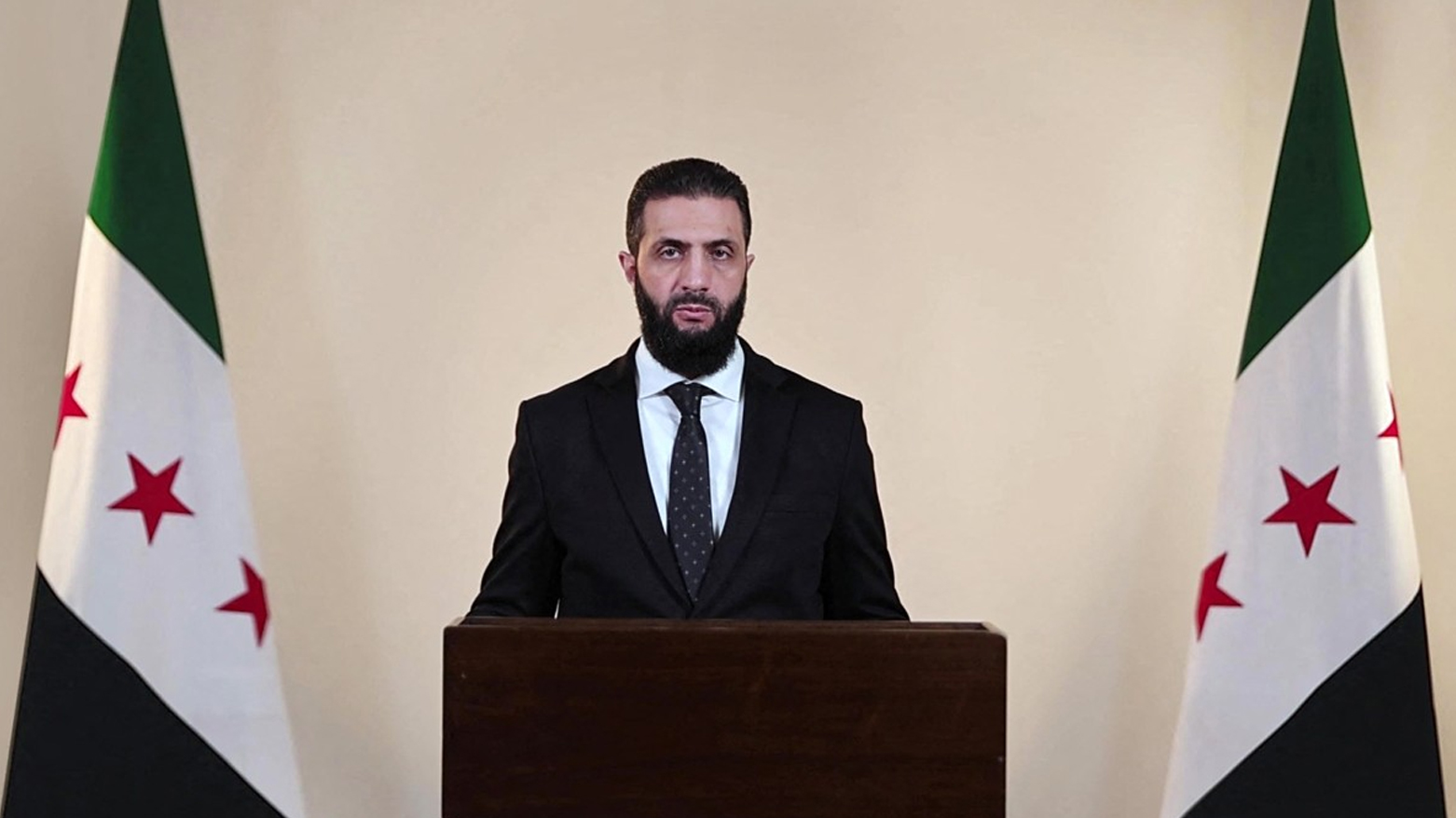Syrian President: I Am Not Linked to the Muslim Brotherhood, and I am the One Most Harmed by ISIS.
Syrian President al-Sharaa denies Muslim Brotherhood ties, claims he is "the greatest victim" of ISIS. In an interview, he rejected partition, and cautiously addressed potential future peace with Israel.

ERBIL (Kurdistan 24) – Syrian President Ahmed al-Al-Sharaa firmly rejected allegations of affiliation with the Muslim Brotherhood, stressing in a wide-ranging interview with Kuwait’s Al-Nahar newspaper on Tuesday that he was “the greatest victim” of the so-called Islamic State (ISIS). Al-Sharaa, who came to power after the overthrow of Bashar al-Assad in December, emphasized that “all nationalist and Islamist ideologies in the region have failed,” underscoring his belief in a new political course for Syria.
Al-Sharaa revealed that he will deliver a speech before the United Nations General Assembly in September—becoming the first Syrian president to do so since 1967. Asked whether he would use the platform to shield Syria from potential international intervention similar to Bosnia or East Timor, Al-Sharaa argued the Syrian case was unique.
He asserted that Syria has the right to question the UN itself: “Where was the international community when hundreds of thousands of Syrians were killed, millions displaced, and thousands imprisoned?” He highlighted that the change in Syria on December 8 occurred without chaos, looting, or killings, but rather with families rushing to prisons and cemeteries to search for their loved ones.
On the question of whether Syria could eventually join the Abraham Accords, Al-Sharaa was cautious. He noted that the countries which joined had no occupied land, while Syria’s relationship with Israel can only be addressed through the return of the Golan Heights and the implementation of the 1974 disengagement agreement.
“A permanent peace could be considered if it served Syria’s interest and if the Syrian people believed in it,” he said. “But it is not close—especially under the current situation in Gaza and with Prime Minister Netanyahu’s leadership in Israel.”
Turning to internal challenges, Al-Sharaa dismissed any prospect of Syria’s partition, labeling secessionist aspirations “a dream that will never be realized.” He argued that such a decision belongs to the Syrian people, who overwhelmingly reject division, adding that Syria’s mixed demographics make partition impossible.
“Blood would be shed and nothing positive would come from it,” he warned, criticizing foreign projects to foster proxy wars on Syrian soil. He also recalled that Israeli ambitions to penetrate southern Syria had been thwarted, emphasizing that despite decades, the international community still refuses to recognize Israel’s annexation of the Golan.
Al-Sharaa stressed that Sweida, despite unrest, remains deeply connected to Damascus, and the solution lies not in military escalation but in “cooling tensions to reach a consensual settlement.” He said the same principle applied to the Kurds, acknowledging past injustices while insisting their rights are safeguarded “within one Syrian homeland.” He called for armed groups to integrate into the national army, declaring that “all solutions are possible at the negotiating table—except separation.”
In his remarks, Al-Sharaa declared that all ideological projects in the region—both Arab nationalist and Islamist—have failed. He reiterated his independence from the Muslim Brotherhood and described himself as the primary victim of ISIS atrocities.
“Thousands of my followers were killed by ISIS,” he said, recalling how narratives were twisted: “We went to Iraq to fight the American occupation alongside Iraqis of all components. Strangely, those Iraqis later became called mujahideen, while we, who did the same, were branded as terrorists. This is a contradiction.”
The Syrian Interim president praised Iraqi Prime Minister Mohammed Shia al-Sudani for refraining from interfering in Syria after recent political changes, saying such restraint helped avoid instability in both countries. He also commended Sudani’s economic focus and commitment to alleviating Iraqi suffering.
“The Syrian and Iraqi peoples represent a natural closeness that political leaderships in the past divided,” Al-Sharaa said. He argued that future cooperation in economic projects could strengthen both nations. He also noted the pressures of Iraq’s upcoming elections and expressed surprise at Iraqi groups that criticized Syria despite Damascus never demanding an apology from them.
Looking ahead, Al-Sharaa highlighted Syria’s untapped economic potential. He said the country intends to maximize the use of its cultural, historical, and religious sites, along with its Mediterranean ports in Latakia and Tartus, which could be linked by railways to Gulf ports.
“This would greatly shorten trade routes between China and Europe,” he said, adding that internet cables passing through Syria save nearly 6,000 kilometers.
He also criticized the economic legacy of late Egyptian President Gamal Abdel Nasser during the short-lived Egyptian-Syrian union, saying that nationalization and reliance on the public sector devastated Syria’s economy. “What suited Egypt did not suit Syria,” Al-Sharaa argued, noting that such policies contributed to the collapse of Soviet-aligned states.
Al-Sharaa firmly rejected the notion of a “river of fire” separating Syria and Lebanon, while also opposing Syrian meddling in Lebanese affairs. “Intervention complicates, it does not ease,” he said, stressing that Lebanon must be shielded from external pressures that risk destabilizing the country.
He called for Lebanese and Syrian communities to base relations on a “win-win” principle through cooperation, instead of the “loss-loss” dynamic born of conflict.
“Escalation and war are the easy choices, but they destroy countries and solve nothing,” he said, recalling that the formation of Syria’s transitional government carried positive messages to Iraq and Lebanon. He explained that the cabinet was deliberately designed to replace sectarian quotas with political participation, drawing a parallel with federalism: while Syrians may view it as a path to division, decentralization enshrined in the constitution could safeguard diversity without undermining unity.
In conclusion, Al-Sharaa underlined that Syria’s strength lies in its internal cohesion and its regional and international alliances. He reiterated his commitment to safeguarding Syria’s territorial integrity and ensuring that all solutions remain within the framework of one state.
“All projects short of secession are open for discussion,” he said, “but partition will never be accepted.”
